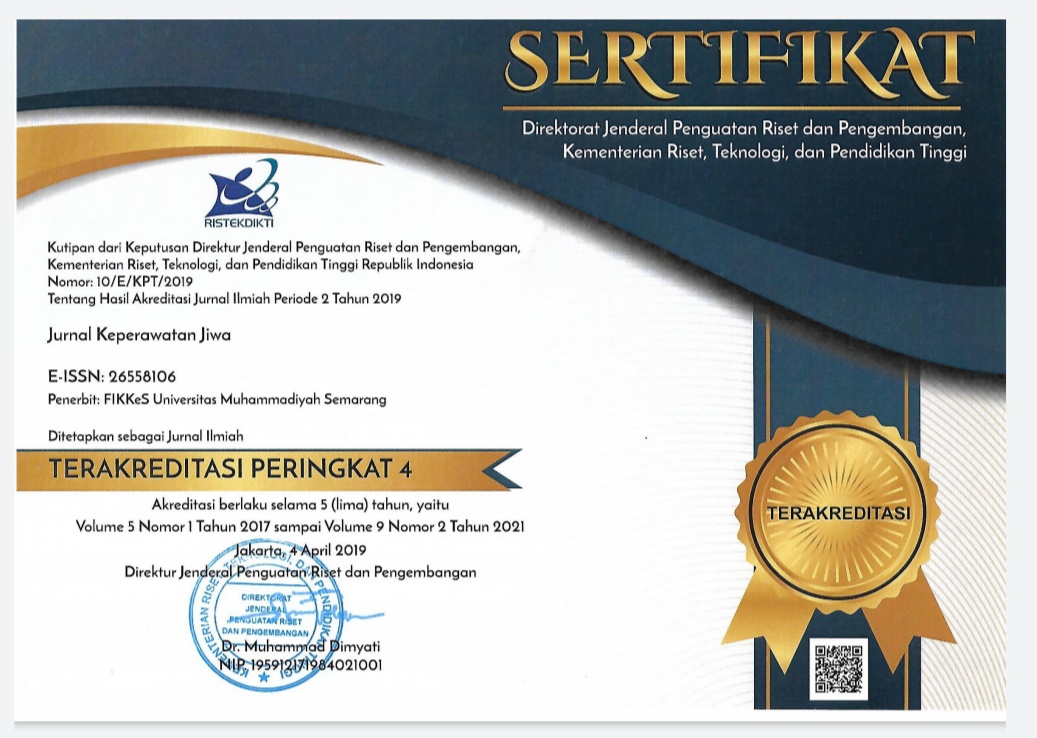Academic Self-Concept on Bully Victims in Early Adolescent
(1) Universitas Padjadjaran
(2) Universitas Padjadjaran
(3) Universitas Padjadjaran
(*) Corresponding Author
Abstract
Bullying that occurs in schools have negative impacts on victims rather than perpetrators. Bullying has an influence on the social adjustment of the victims that affects school achievement. In education, academic self-concept has an important role in the achievement of student learning in school and help students respond to bullying behavior. The aim for this study was to identify the academic self-concept on bully victims in early adolescent that consist of academic, social, and self-regard. This research was a quantitative descriptive research. The population in this research were all bully victims from grade 7 and 8, the sample technique used was total sampling with 91 respondents. Data were taken by using academic self-concept instrument from Sriati which consist of 45 statements using likert scale with validity value 0,339-0,761 and reliability 0,952. The academic self-concept analyzed by mean of both total and each dimension. The results were shown by percentage. The results of this study indicated that some respondents i.e. 47 people (51,6%) had positive academic self-concept and about 44 people (48,4%) had negative academic self-concept. In academic dimension, 48 people (52,7%) had positive aspect, social dimension mostly 55 people (60,4%) had positive aspect, and self-regard most of 51 people (56%) had positive aspect. The positive academic self-concept and negative academic self-concept on bully victims in early adolescents were not much different.
Keywords
Full Text:
PDFReferences
Agustiani. Psikologi Perkembangan: Perkembangan Ekologi Kaitannya dengan Konsep Diri dan Penyesuaian Diri pada Remaja. Bandung: PT. Refika Aditama; 2009.
Aviani, H. M. (2015). Tubuh-Tubuh Intimidasi. Jurnal Tingkat Sarjana Seni Rupa No. 1, (1), 1–9.
Baek, S., Yoo, H., & Baek, S. (2017). Issues in Mental Health Nursing Ecological Factors Influencing Emotional / Behavioral Problems and Self-Concept in Adolescents from Low-Income Families in South Korea Ecological Factors Influencing Emotional / Behavioral Problems and Self-Concept in Adolescents from Low-Income Families in South Korea. Issues in Mental Health Nursing, 0(0), 1–9. https://doi.org/10.1080/01612840.2017.1325949
Bong, M., & Skaalvik, E. M. (2003). Academic Self-Concept and Self-Efficacy : How Different Are They Really? Educational Psychology Review, 15(1), 1–40.
Dwipayanti, I. A. S., & Indrawati, K. R. (2014). Hubungan Antara Tindakan Bullying dengan Prestasi Belajar Anak Korban Bullying pada Tingkat Sekolah Dasar Ida Ayu Surya Dwipayanti dan Komang Rahayu Indrawati. Jurnal Psikologi Udayana, 1(2), 251–260.
Febriana, B., Poeranto, S., Kapti, R. E., Ilmu, F., Universitas, K., Sultan, I., Brawijaya, U. (2015). Pengaruh terapi kognitif terhadap harga diri remaja korban bullying. Jurnal Ilmu Keperawatan Universitas Islam Sultan Agung, 4(1), 73–84.
Hattie, John. (1992). Self-Concept. New York: Psychology Press.
Herdyanti, F., & Margaretha, M. (2016). Hubungan Antara Konsep Diri Dengan Kecenderungan Menjadi Korban Bullying Pada Remaja Awal. Jurnal Psikologi Undip, 15(2), 92-98.
Hoglund, W. L. G. (2007). School Functioning in Early Adolescence: Gender-Linked Responses to Peer Victimization. Journal of Educational Psychology, 99(4), 683–699. https://doi.org/10.1037/0022-0663.99.4.683
Houbre, B., Tarquinio, C., & Lanfranchi, J.-B. (2010). Expression of self-concept and adjustment against repeated aggressions : the case of a longitudinal study on school bullying. European Journal of P, 25(1), 105–123. https://doi.org/10.1007/s10212-009-0005-x
Indonesia, UNICEF. (2015). Laporan Tahunan Indonesia 2015.
Jenkins, L. N. (2015). Indirect Effects in the Peer Victimization-Academic Achievement Relation: The Role of Academic Self-Concept and Gender. Psychology in the Schools, 52(3), 153–178. https://doi.org/10.1002/pits
Juvonen, J., Wang, Y., & Espinoza, G. (2011). Bullying experiences and compromised academic performance across middle school grades. Journal of Early Adolescence, 31(1), 152–173. https://doi.org/10.1177/0272431610379415
Kaukiainen, A., Salmivalli, C., Lagerspetz, K., Tamminen, M., Vauras, M., Mäki, H., & Poskiparta, E. (2002). Learning difficulties, social intelligence, and self-concept: Connections to bully-victim problems. Scandinavian Journal of Psychology, 43(3), 269–278. https://doi.org/10.1111/1467-9450.00295
Kibriya, S., Xu, Z. P., & Zhang, Y. (2016). The negative consequences of school bullying on academic performance and mitigation through female teacher participation : evidence from Ghana. Applied Economics, 0(0), 1–11. https://doi.org/10.1080/00036846.2016.1240350
Lösch, T., Lüdtke, O., Robitzsch, A., Kelava, A., Nagengast, B., & Trautwein, U. (2017). A Well-Rounded View: Using an Interpersonal Approach to Predict Achievement by Academic Self-Concept and Peer Ratings of Competence. Contemporary Educational Psychology. https://doi.org/10.1016/j.cedpsych.2017.07.003
Ma, L., Phelps, E., Lerner, J. V, Lerner, R. M., & Phelps, E. (2009). Academic Competence for Adolescents Who Bully and Who Are Bullied. The Journal of Early Adolescence, 29 Number. http://doi.org/10.1177/0272431609332667
Marsh, H. W., & Martin, A. J. (2011). Academic self-concept and academic achievement: Relations and causal ordering. British Journal of Educational Psychology, 81(1), 59–77. https://doi.org/10.1348/000709910X503501
Matovu, M. (2012). Academic Self-Concept and Academic Achievement among University Students. International Online Journal of Educational Sciences, 4(1), 107–116.
Permenkes. (2014). Peraturan Menteri Kesehatan Republik Indonesia Nomor 75 Tahun 2014 Tentang Pusat Kesehatan Masyarakat. Jakarta.
Raskauskas, J. (2010). Multiple peer victimization among elementary school students: relations with social-emotional problems. Social Psychology of Education, 18(2), 523–539. https://doi.org/10.1007/s11218-010-9124-0
Samiroh, S., & Muslimin, Z. (2016). Hubungan Antara Konsep Diri Akademik dan Perilaku Menyontek pada Siswa- Siswi Mas Simbangkulon Buaran Pekalongan. Psikis : Jurnal Psikologi Islami, 1(2), 67-77. Retrieved from http://jurnal.radenfatah.ac.id/index.php/psikis/article/view/569
Sriati, A. (2010). Pengaruh Konsep Diri dan Motivasi Berprestasi Terhadap Prestasi Akademik Remaja Akhir.
Wilson, H. E., Siegle, D., Mccoach, D. B., Little, C. A., Reis, S. M., Little, C. A., & Reis, S. M. (2014). Gifted Child Quarterly. Gifted Child Quarterly, 58(2), 111–126. https://doi.org/10.1177/0016986214522858
Wolke, D., & Lereya, S. T. (2015). Long-term effects of bullying. British Medical Journal, 100, 879–885. http://doi.org/10.1136/archdischild-2014-306667
Wu, W., Luu, S., & Luh, D. (2016). Defending behaviors , bullying roles , and their associations with mental health in junior high school students : a population- based study. BMC Public Health, (110), 1–11. http://doi.org/10.1186/s12889-016-3721-6
Article Metrics
Abstract view : 573 timesPDF - 100 times
DOI: https://doi.org/10.26714/jkj.8.3.2020.247-254
Refbacks
- There are currently no refbacks.
PPNI Univ. Muhammadiyah Semarang
Jl. Kedungmundu Raya No. 18 Semarang Gedung NRC University of Muhammadiyah Semarang
Phone: 02476740287
Fax: 02476740287
Email: [email protected]
This work is licensed under a Creative Commons Attribution 4.0 International License.


